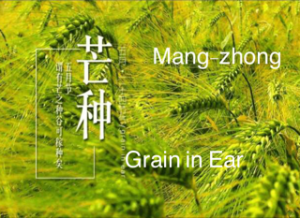
Mang-zhong (Globe Language) (noun) 芒种 (Chinese): Grain in Ear (9th solar term), literally in Chinese “Mang” 芒 = awn (grain), “zhong” 种 = planting.
Example:
In the ancient Chinese agriculture calendar, Mang-zhong is the 9th term out of 24 solar terms in a year. Mang-zhong begins when the Sun reaches the celestial longitude of 75° and ends when it reaches the longitude of 90°. Mang-zhong often refers in particular to the day when the Sun is exactly at the celestial longitude of 75°. In the Gregorian calendar, Mang-zhong usually begins around June 5 (June 6 East Asia time) and ends around June 21. During Mang-zhong, crops like barley and wheat are ready to be harvested, while other plants such as rice are especially critical for planting. Mang-zhong is the busiest period for farmers in China. One of the Chinese proverbs is “Getting busy with farm work in Mang-zhong.” There is also an old saying in Guizhou province that goes, “If you don’t plant rice in Mang-zhong, planting will be in vain.” The homonym of Mang-zhong indicates different meanings of “awn (grains) species” 芒种 and “busy planting” 忙种. During Mang-zhong, it is said that any crops of awns can be cropped. In ancient China, Mang-zhong was divided into three periods; in the first-period “螳螂生” the eggs of mantis that are produced in the late autumn become small mantises due to the sensation of “yin” climate. During the second period “鵙始鸣” you can hear shrike chirping, while in the third period “反舌无声” mockingbirds stop chirping because of “yin” climate.
Since ancient times, Mang-zhong has been a solar term for agricultural purposes in the lunar calendar. Mang-zhong is still remembered and celebrated as a Chinese traditional festival.
